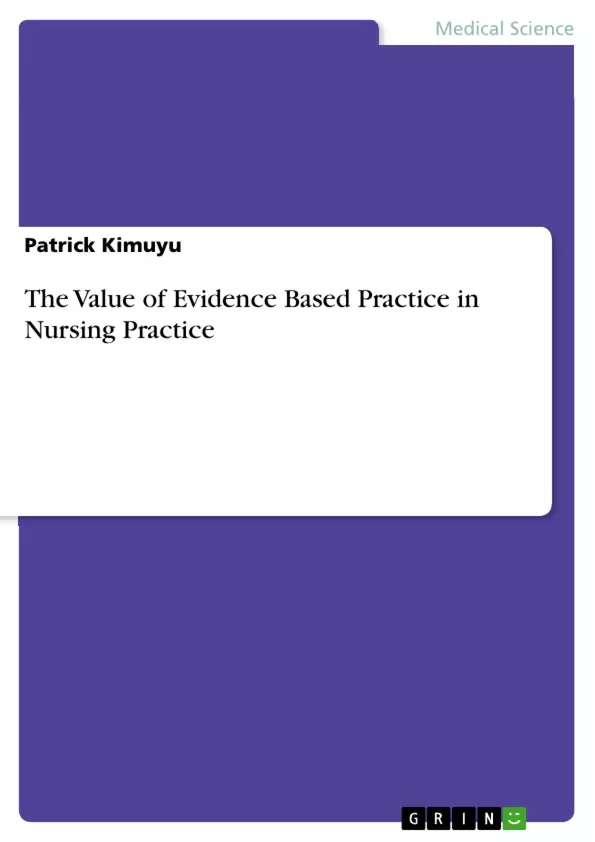The purpose of this paper is to discuss the significance of evidence based practice in improving patient outcomes. It is aimed at discussing the significance of adopting evidence based practice based on the PICOT question. In this case, the PICOT question states, “In patients diagnosed with HPV, what is the effect of human papillomavirus vaccination compared to no treatment on HPV rates?” This question has immense significance to nursing practice because it offers an opportunity for understanding how the adoption of this evidence based practice leads to better outcomes. Human papillomavirus vaccination exhibits effectiveness in reducing the rates of infection.
Inhaltsverzeichnis (Table of Contents)
- Introduction
- Purpose Statement
- Summary of Findings
- Relevant Evidence-based Nursing Practice
- How HPV Vaccination Contributes To Better Outcomes
- Potential Negative Outcomes That Could Result From Failing to Use the Evidence-Based Practice
- Strategy for Disseminating the Evidence-Based Practice
- Implementing the Evidence-Based Practice within the Organization
- Address Concerns and Opposition to the Change in Practice
- Conclusion
Zielsetzung und Themenschwerpunkte (Objectives and Key Themes)
This paper aims to discuss the significance of evidence-based practice in improving patient outcomes, specifically focusing on the adoption of human papillomavirus (HPV) vaccination. It utilizes the PICOT question, "In patients diagnosed with HPV, what is the effect of human papillomavirus vaccination compared to no treatment on HPV rates?" to explore the effectiveness of HPV vaccination in reducing HPV infection.
- The importance of evidence-based practice in nursing
- The effectiveness of HPV vaccination in reducing HPV infection rates
- The impact of HPV vaccination on patient outcomes
- Strategies for implementing and disseminating evidence-based practices
- Addressing concerns and opposition to adopting new practices
Zusammenfassung der Kapitel (Chapter Summaries)
- Introduction: Introduces the concept of evidence-based practice in nursing and its impact on healthcare quality and patient outcomes. Highlights the importance of critically appraising research evidence and cites examples of successful evidence-based nursing practices, such as HPV vaccination.
- Purpose Statement: Outlines the purpose of the paper, which is to discuss the significance of evidence-based practice, particularly HPV vaccination, in improving patient outcomes. Presents the PICOT question that guides the discussion, emphasizing its relevance to nursing practice.
- Summary of Findings: Summarizes research findings on the effectiveness of HPV vaccination, drawing upon various studies that have investigated the impact of vaccination on HPV infection rates and the role of strategies to enhance vaccination uptake.
- Relevant Evidence-based Nursing Practice: Identifies HPV vaccination as a key evidence-based nursing practice that improves patient outcomes based on the reviewed literature. Highlights studies demonstrating the effectiveness of HPV vaccination in reducing cervical cancer and HPV infection rates.
- How HPV Vaccination Contributes To Better Outcomes: Discusses the mechanisms by which HPV vaccination improves patient outcomes, including conferring immunity against HPV infection, reducing the risk of HPV-related complications such as cervical cancer, and enhancing patient safety and quality of life.
- Potential Negative Outcomes That Could Result From Failing to Use the Evidence-Based Practice: Explores the potential negative consequences of failing to adopt HPV vaccination as an evidence-based practice, including increased rates of HPV-related abnormalities like cervical cancer and a decline in patient quality of life.
- Strategy for Disseminating the Evidence-Based Practice: Proposes a strategy for disseminating HPV vaccination as an evidence-based practice throughout the practice setting, emphasizing the importance of nurse and healthcare provider education through seminars and other communication channels.
- Implementing the Evidence-Based Practice within the Organization: Outlines a process for implementing HPV vaccination as an evidence-based practice within an organization, suggesting the development of standard guidelines and encouraging nurses and other healthcare providers to adopt this practice.
- Address Concerns and Opposition to the Change in Practice: Addresses the need for establishing an implementation committee to address concerns and manage the change process, emphasizing the importance of assessing the implementation process, identifying barriers, and developing appropriate change management strategies.
Schlüsselwörter (Keywords)
The main keywords and focus topics of this text are evidence-based practice, nursing practice, HPV vaccination, patient outcomes, HPV infection, cervical cancer, implementation strategies, change management, and organizational transformation.
- Quote paper
- Patrick Kimuyu (Author), 2018, The Value of Evidence Based Practice in Nursing Practice, Munich, GRIN Verlag, https://www.grin.com/document/421308



